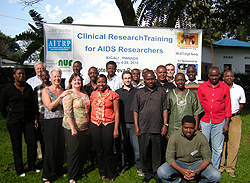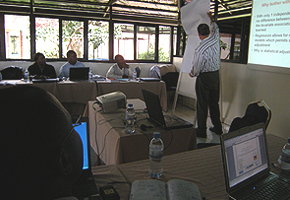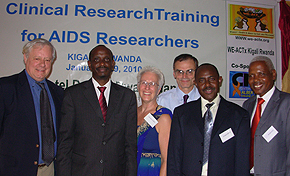

Training Clinical Researchers Abroad
In Rwanda, the Seeds for Research Are Planted
At a hotel in rural Rwanda, faculty members of Einstein’s Clinical Research Training Program (CRTP) recently oversaw the training of 13 Rwandan health professionals, eager to learn about clinical research. Through their newfound skills, these Rwandan scholars will serve as pioneers in developing the practice of clinical research in their homeland.

Members of Einstein’s CRTP faculty pose
with physician- and scientist-trainees and
Rwandan leadership following the January
2010 Research Training Workshop they
offered in Rwamagana, Rwanda. Through the CRTP at Einstein, physicians and other healthcare professionals can earn a master’s degree in clinical research. The program in Rwanda, funded by Einstein’s AIDS International Training Research Program (AITRP) grant from the National Institutes of Health, has proven to be the first step in potential collaboration between Einstein and the Rwandan Ministry of Health to develop scientific research in the small African nation.
“Rwanda is an inspiring place to work,” said Dr. Kathy Anastos, professor of medicine and of epidemiology & population health, and leader of the Einstein team’s efforts in Rwanda. As head of Women’s Equity in Access to Care & Treatment (WE-ACTx), established in 2003, Dr. Anastos has built a relationship with the Rwandan leadership while offering sustainable programs through which Rwandan women and their children receive medical care — particularly to address their much-needed access to HIV testing, treatment, support and education.
“The government is visionary and mission-driven,” she added. “In just a few years, they have designed perhaps the most effective HIV treatment program in the world. And now they are supporting research because they recognize the value having skilled researchers will mean to the clinical efforts already in place.”
Billed as “scientific capacity building,” the Einstein AITRP’s Rwandan research training program adapted its curriculum from the College of Medicine’s CRTP summer program — typically an intensive six-week program — condensed into an intensified four-week period to fit the time allotted to the Rwandan healthcare professionals for their participation. Overall training for the participants will ultimately include follow-up training, both in-country and via teleconferences; future visits to the U.S.; and, for a select few, enrollment in the two-year CRTP to earn a Master’s degree at Einstein.

“The countryside is among the most
beautiful I’ve seen, with rolling hills
and fields of cabbage, bananas
and greens that create a magnificent
patchwork quilt,” observed a member
of the Einstein faculty who traveled
to Rwanda. “Although the curriculum was based on our CRTP here, it was a condensed version of it,” said Dr. Aileen McGinn, assistant professor of epidemiology & population health, who taught the data analysis component. “On a rotating basis, between 8 a.m. and noon each day, we provided lectures on data analysis, biostatistics, epidemiology and bioethics. The afternoons were devoted to homework and further studies connected to the research project focused on HIV that each scholar had proposed.”
She added, “Ultimately, we want to help the scholars become independent researchers who will be able to publish their work. Even now, we maintain e-mail contact with them as they continue the work they began during the program.”
“This program was similar to one we had done with support from AITRP in Mumbai, India,” said Dr. Hillel Cohen, associate professor of epidemiology & population health and instructor of the biostatistics course. “Three of the scholars in that program were from Rwanda, which sparked the idea for conducting the program in Africa.
“A particularly gratifying aspect of our efforts in Rwanda was having a graduate of the CRTP on our faculty,” he added, referring to Dr. Ethan Cowan, assistant professor of emergency medicine and of epidemiology & population health, who taught the bioethics course.
Also among the CRTP faculty in Rwanda was a current CRTP candidate at Einstein and Rwandan native Dr. Jean-Claude Dusingize, who relished the opportunity to share all he has learned with his fellow countrymen — which included some of his mentors. “The field of research is a virgin area in Rwanda,” he said. “The Minister of Health has demonstrated his excitement about the prospects this training offers us. He made it possible for all the scholars to have the full month off to focus on the training they would receive.”

Dr. Hillel Cohen conducts a class on biostatisticsHe added, “It is my hope that we can continue this program and the mentorship it offers. It also will be helpful if more scholars can come to Einstein to train in the M.S. program, because when you are a full-time student you can be more immersed in the learning.”
Dr. Dusingize is using data from his homeland — obtained through Dr. Anastos’ Rwanda Women’s Interassociation Study and Assessment (RWISA) — to look at insulin resistance in women receiving HIV treatment. While he continues with his studies in the U.S., plans are in place for follow up with the Rwandan scholars.
“We are maintaining e-mail contact with them, helping them fast track to publishing, while also thinking about new research ideas,” explained Dr. Anastos. “The goal is to build a group of researchers who, over time, can become the research leadership in Rwanda.”
Following the completion of the four-week program she reported, “This has been a successful event on many levels. Every single one of the scholars was extremely dedicated, studying not only when we were there to support them but well into the evenings, and all passed the exams… They have enthusiastically embraced their ongoing work… and have outlined research papers using either RWISA data or other local data sets. The Minister of Health suggested we pursue a broader collaboration and is extremely supportive of research capacity building.”
AITRP’s principal investigator, Dr. Vinayaka Prasad, professor of microbiology & immunology, observed, “The success of this program expands the number of health professionals doing clinical AIDS research on the ground in Rwanda. On the whole, it increases their capacity for AIDS prevention research, which is critical to addressing the disease.”

From left: Dr. Michael Mulvihill, Einstein faculty;
Dr. Richard Sezibera, Honorable Minister of Health,
Rwanda; Dr. Kathryn Anastos, Einstein faculty
and WE-ACTx cofounder; Dr. Hillel Cohen, Einstein
faculty; Dr. Eugene Mutimura, WE-ACTx director
of research and scientific capacity building; and
Simon Ntare, WE-ACTx country director, RwandaThrough the AITRP grant, currently in its tenth year, Einstein has now funded programs in India, Rwanda and Bangladesh, training approximately 125 health professionals through these intensive, in-country programs. In the past four years, another 30 individuals have received support to train in laboratories, including 5 currently in residence at Einstein.
The grant also has funded Dr. Dusingize’s participation in the CRTP at Einstein. Additonally, the AITRP and CRTP steering committees recently accepted a second Rwandan scholar, Jean D’Amour Sinayobye, who will arrive this June to begin his two-year training.
“Finding Dr. Sinayobye and recruiting him to Einstein’s CRTP is exactly the type of outcome that we envisioned the four-week, in-country training would help initiate. Dr. Sinayobye was among the health professionals who attended our program in Rwanda,” said Dr. Prasad.
Supporting the participation of one or two Rwandan scholars in the full, two-year CRTP program is an important aspect of the AITRP. “As a result, when these scholars return to Rwanda they enhance the research infrastructure there,” noted Dr. Ellie Schoenbaum, director of Einstein’s CRTP. “What’s more, the capacity building is tiered according to training level and a dynamic relationship with Einstein’s research training programs.”
To fully augment the research training experience for the Rwanda program participants, the AITRP also interacts closely with both the Einstein-Montefiore Center for AIDS Research (CFAR) and Dr. Anastos’ WE-ACTx.
“The success in Rwanda has had a ripple effect already,” he added. An Einstein researcher recently received a pilot grant from our Global Health Center to work in Rwanda in conjunction with Dr. Anastos, and another has received a pilot grant from CFAR, jointly with Dr. Anastos, to examine the effects of nutrition and antiretroviral therapy on inflammation among Rwandan women.”
He added, “We hope to expand our in-country training to South Africa as well.”
Posted on: Friday, May 21, 2010

Tablet Blog